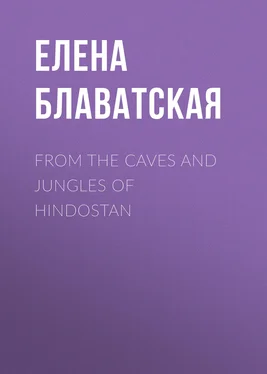Елена Блаватская - From the Caves and Jungles of Hindostan
Здесь есть возможность читать онлайн «Елена Блаватская - From the Caves and Jungles of Hindostan» — ознакомительный отрывок электронной книги совершенно бесплатно, а после прочтения отрывка купить полную версию. В некоторых случаях можно слушать аудио, скачать через торрент в формате fb2 и присутствует краткое содержание. Жанр: Путешествия и география, История, foreign_edu, foreign_antique, foreign_prose, на английском языке. Описание произведения, (предисловие) а так же отзывы посетителей доступны на портале библиотеки ЛибКат.
- Название:From the Caves and Jungles of Hindostan
- Автор:
- Жанр:
- Год:неизвестен
- ISBN:нет данных
- Рейтинг книги:5 / 5. Голосов: 1
-
Избранное:Добавить в избранное
- Отзывы:
-
Ваша оценка:
- 100
- 1
- 2
- 3
- 4
- 5
From the Caves and Jungles of Hindostan: краткое содержание, описание и аннотация
Предлагаем к чтению аннотацию, описание, краткое содержание или предисловие (зависит от того, что написал сам автор книги «From the Caves and Jungles of Hindostan»). Если вы не нашли необходимую информацию о книге — напишите в комментариях, мы постараемся отыскать её.
From the Caves and Jungles of Hindostan — читать онлайн ознакомительный отрывок
Ниже представлен текст книги, разбитый по страницам. Система сохранения места последней прочитанной страницы, позволяет с удобством читать онлайн бесплатно книгу «From the Caves and Jungles of Hindostan», без необходимости каждый раз заново искать на чём Вы остановились. Поставьте закладку, и сможете в любой момент перейти на страницу, на которой закончили чтение.
Интервал:
Закладка:
"All these are our brothers," mildly observed the keeper, pointing to the hundreds of animals and insects. "How can you Europeans kill and even devour them?"
"What would you do," I asked, "if this snake were about to bite you? Is it possible you would not kill it, if you had time?"
"Not for all the world. I should cautiously catch it, and then I should carry it to some deserted place outside the town, and there set it free."
"Nevertheless; suppose it bit you?"
"Then I should recite a mantram, and, if that produced no good result, I should be fair to consider it as the finger of Fate, and quietly leave this body for another."
These were the words of a man who was educated to a certain extent, and very well read. When we pointed out that no gift of Nature is aimless, and that the human teeth are all devouring, he answered by quoting whole chapters of Darwin's Theory of Natural Selection and Origin of Species. "It is not true," argued he, "that the first men were born with canine teeth. It was only in course of time, with the degradation of humanity,—only when the appetite for flesh food began to develop—that the jaws changed their first shape under the influence of new necessities."
I could not help asking myself, "Ou la science va-t'elle se fourrer?"
The same evening, in Elphinstone's Theatre, there was given a special performance in honour of "the American Mission," as we are styled here. Native actors represented in Gujerati the ancient fairy drama Sita-Rama, that has been adapted from the Ramayana, the celebrated epic by Vilmiki. This drama is composed of fourteen acts and no end of tableaux, in addition to transformation scenes. All the female parts, as usual, were acted by young boys, and the actors, accord-ing to the historical and national customs, were bare-footed and half-naked. Still, the richness of the costumes, the stage adornments and transformations, were truly wonderful. For instance, even on the stages of large metropolitan theatres, it would have been difficult to give a better representation of the army of Rama's allies, who are nothing more than troops of monkeys under the leadership of Hanuman—the soldier, statesman, dramatist, poet, god, who is so celebrated in history (that of India s.v.p.). The oldest and best of all Sanskrit dramas, Hanuman-Natak, is ascribed to this talented forefather of ours.
Alas! gone is the glorious time when, proud of our white skin (which after all may be nothing more than the result of a fading, under the influences of our northern sky), we looked down upon Hindus and other "niggers" with a feeling of contempt well suited to our own magnificence. No doubt Sir William Jones's soft heart ached, when translating from the Sanskrit such humiliating sentences as the following: "Hanuman is said to be the forefather of the Europeans." Rama, being a hero and a demi-god, was well entitled to unite all the bachelors of his useful monkey army to the daughters of the Lanka (Ceylon) giants, the Rakshasas, and to present these Dravidian beauties with the dowry of all Western lands. After the most pompous marriage ceremonies, the monkey soldiers made a bridge, with the help of their own tails, and safely landed with their spouses in Europe, where they lived very happily and had a numerous progeny. This progeny are we, Europeans. Dravidian words found in some European languages, in Basque for instance, greatly rejoice the hearts of the Brahmans, who would gladly promote the philologists to the rank of demi-gods for this important discovery, which confirms so gloriously their ancient legend. But it was Darwin who crowned the edifice of proof with the authority of Western education and Western scientific literature. The Indians became still more convinced that we are the veritable descendants of Hanuman, and that, if one only took the trouble to examine carefully, our tails might easily be discovered. Our narrow breeches and long skirts only add to the evidence, however uncomplimentary the idea may be to us.
Still, if you consider seriously, what are we to say when Science, in the person of Darwin, concedes this hypothesis to the wisdom of ancient Aryas. We must perforce submit. And, really, it is better to have for a forefather Hanu-man, the poet, the hero, the god, than any other monkey, even though it be a tailless one. Sita-Rama belongs to the category of mythological dramas, something like the tragedies of Aeschylus. Listening to this production of the remotest antiquity, the spectators are carried back to the times when the gods, descending upon earth, took an active part in the everyday life of mortals. Nothing reminds one of a modern drama, though the exterior arrangement is the same. "From the sublime to the ridiculous there is but a step," and vice versa. The goat, chosen for a sacrifice to Bacchus, presented the world tragedy (greek script here). The death bleatings and buttings of the quadrupedal offering of antiquity have been polished by the hands of time and of civilization, and, as a result of this process, we get the dying whisper of Rachel in the part of Adrienne Lecouvreur, and the fearfully realistic "kicking" of the modern Croisette in the poisoning scene of The Sphinx. But, whereas the descendants of Themistocles gladly receive, whether captive or free, all the changes and improvements considered as such by modern taste, thinking them to be a corrected and enlarged edition of the genius of Aeschylus; Hindus, happily for archaeologists and lovers of antiquity, have never moved a step since the times of our much honoured forefather Hanuman.
We awaited the performance of Sita-Rama with the liveliest curiosity. Except ourselves and the building of the theatre, everything was strictly indigenous and nothing reminded us of the West. There was not the trace of an orchestra. Music was only to be heard from the stage, or from behind it. At last the curtain rose. The silence, which had been very remarkable before the performance, considering the huge crowd of spectators of both sexes, now became absolute. Rama is one of the incarnations of Vishnu and, as most of the audience were worshippers of Vishnu, for them the spectacle was not a mere theatrical performance, but a religious mystery, representing the life and achievements of their favourite and most venerated gods.
The prologue was laid in the epoch before creation began (it may safely be said that no dramatist would dare to choose an earlier one)—or, rather, before the last manifestation of the universe. All the philosophical sects of India, except Mussulmans, agree that the universe has always existed. But the Hindus divide the periodical appearances and vanishings into days and nights of Brahma. The nights, or withdrawals of the objective universe, are called Pralayas, and the days, or epochs of new awakening into life and light, are called Manvantaras, Yugas, or "centuries of the gods." These periods are also called, respectively, the inbreathings and outbreathings of Brahma. When Pralaya comes to an end Brahma awakens, and, with this awakening, the universe that rested in deity, in other words, that was reabsorbed in its subjective essence, emanates from the divine principle and becomes visible. The gods, who died at the same time as the universe, begin slowly to return to life. The "Invisible" alone, the "Infinite," the "Lifeless," the One who is the unconditioned original "Life" itself, soars, surrounded by shoreless chaos. Its holy presence is not visible. It shows itself only in the periodical pulsation of chaos, represented by a dark mass of waters filling the stage. These waters are not, as yet, separated from the dry land, because Brahma, the creative spirit of Narayana, has not yet separated from the "Ever Unchanging." Then comes a heavy shock of the whole mass and the waters begin to acquire transparency. Rays, proceeding from a golden egg at the bottom, spread through the chaotic waters. Receiving life from the spirit of Narayana, the egg bursts and the awakened Brahma rises to the surface of the water in the shape of a huge lotus. Light clouds appear, at first transparent and web-like. They gradually become condensed, and transform themselves into Prajapatis, the ten personified creative powers of Brahma, the god of everything living, and sing a hymn of praise to the creator. Something naively poetical, to our unaccustomed ears, breathed in this uniform melody unaccompanied by any orchestra.
Читать дальшеИнтервал:
Закладка:
Похожие книги на «From the Caves and Jungles of Hindostan»
Представляем Вашему вниманию похожие книги на «From the Caves and Jungles of Hindostan» списком для выбора. Мы отобрали схожую по названию и смыслу литературу в надежде предоставить читателям больше вариантов отыскать новые, интересные, ещё непрочитанные произведения.
Обсуждение, отзывы о книге «From the Caves and Jungles of Hindostan» и просто собственные мнения читателей. Оставьте ваши комментарии, напишите, что Вы думаете о произведении, его смысле или главных героях. Укажите что конкретно понравилось, а что нет, и почему Вы так считаете.












